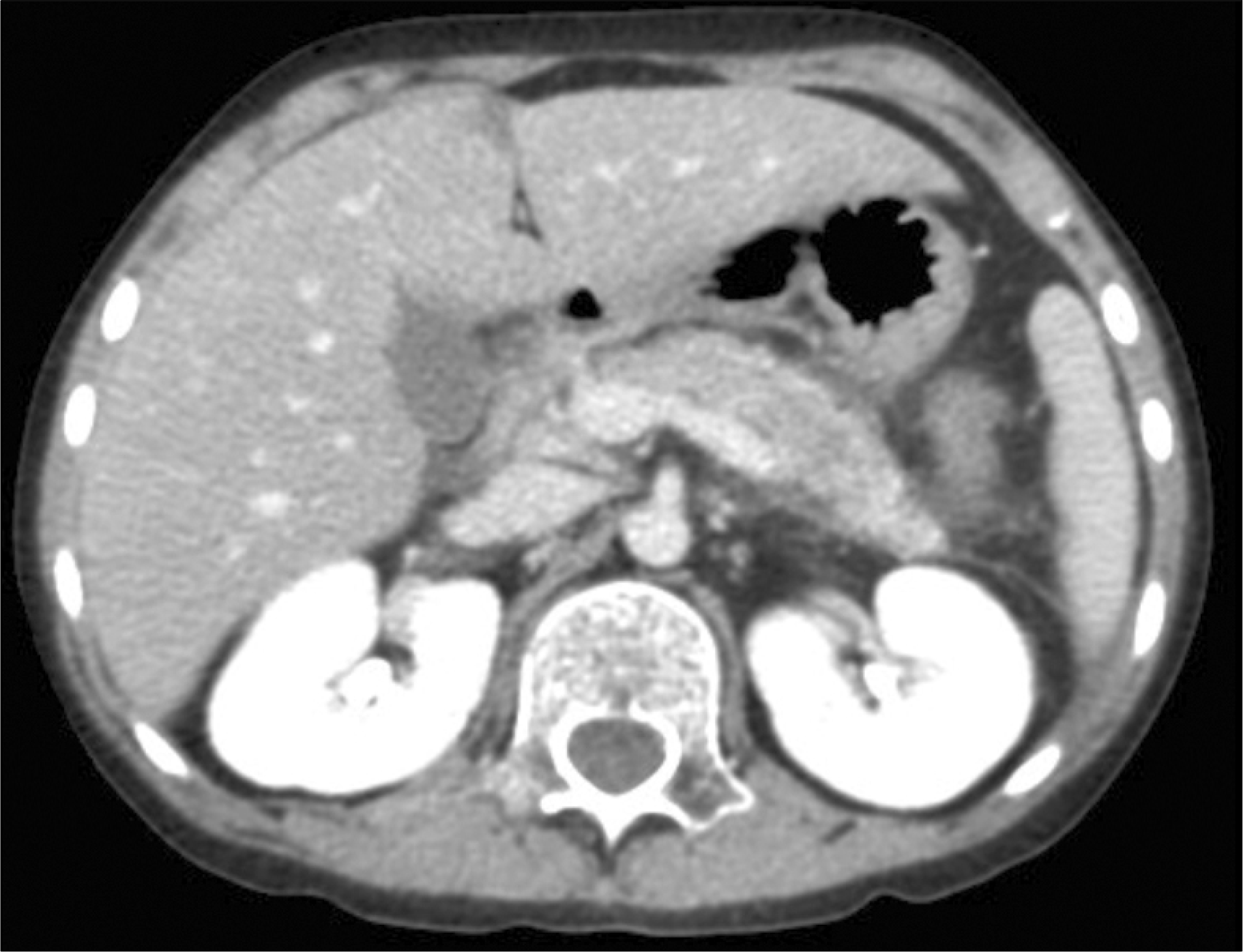Abstract
Although pancreatitis is known as a common complication during the treatment of acute lymphoblastic leukemia, acute pancreatitis that's induced by 6-mercaptopurine or 6-thioguanine is very uncommon. We experienced the case of an 11-year-old boy with consecutive acute pancreatitis, and this was induced by 6-mercaptopurine and 6-thioguanine during maintenance chemotherapy of childhood acute lymphoblastic leukemia. We report here on this along with a review of the pertinent literature.
Go to : 
REFERENCES
1). Runzi M., Layer P. Drug-associated pancreatitis; facts and fiction. Pancreas. 1996. 13:100–9.
2). McBride CE., Yavorski RT., Moses FM., Solimando DA., Byrd JC. Acute pancreatitis associated with continuous infusion cytarabine therapy: a case report. Cancer. 1996. 77:2588–91.

3). Park JE., Kim KM., Seo JJ., Moon HN., Ghim T. Clinical features of pancreatitis in children with leukemia and lymphoma. Korean J Pediatr Hematol Oncol. 1999. 6:48–56.
4). Willert JR., Dahl GV., Marina NM. Recurrent mercaptopurine-induced acute pancreatitis: a rare complication of chemotherapy for acute lymphoblastic leukemia in children. Med Pediatr Oncol. 2002. 38:73–4.

5). Haber CJ., Meltzer SJ., Present DH., Korelitz BI. Nature and course of pancreatitis caused by 6-mercaptopurine in the treatment of inflammatory bowel disease. Gastroenterology. 1986. 91:982–6.

6). Cappell MS., Das KM. Rapid development of pancreatitis following reuse of 6-mercaptopurine. J Clin Gastroenterol. 1989. 11:679–81.

7). Sadoff J., Hwang S., Rosenfeld D., Ettinger L., Spigland N. Surgical pancreatic complications induced by L-asparaginase. J Pediatr Surg. 1997. 32:860–3.

8). Schwab M., Schäffeler E., Marx C, et al. Azathioprine therapy and adverse drug reactions in patients with inflammatory bowel disease: impact of thiopurine S-methyltransferase polymorphism. Pharmacogenetics. 2002. 12:429–36.
9). Bank L., Wright JP. 6-Mercaptopurine-related pancreatitis in 2 patients with inflammatory bowel disease. Dig Dis Sci. 1984. 29:357–9.

10). Dubinsky MC., Feldman EJ., Abreu MT., Targan SR., Vasiliauskas EA. Thioguanine: a potential alternate thiopurine for IBD patients allergic to 6-mercaptopurine or azathioprine. Am J Gastroenterol. 2003. 98:1058–63.

11). Alexander S., Dowling D. Azathioprine pancreatitis in inflammatory bowel disease and successful subsequent treatment with mercaptopurine. Intern Med J. 2005. 35:570–1.

12). Dubinsky MC., Vasiliauskas EA., Singh H, et al. 6-Thioguanine can cause serious liver injury in inflammatory bowel disease patients. Gastroenterology. 2003. 125:298–303.

13). Ravikumara M., Hill FG., Wilson DC, et al. 6-Thioguanine-related chronic hepatotoxicity and variceal haemorrhage in children treated for acute lymphoblastic leukaemia-a dual-centre experience. J Pediatr Gastroenterol Nutr. 2006. 42:535–8.

14). De Bruyne R., Portmann B., Samyn M, et al. Chronic liver disease related to 6-thioguanine in children with acute lymphoblastic leukaemia. J Hepatol. 2006. 44:407–10.

15). Teml A., Schaeffeler E., Herrlinger KR., Klotz U., Schwab M. Thiopurine treatment in inflammatory bowel disease: clinical pharmacology and implication of pharmacogenetically guided dosing. Clin Pharma-cokinet. 2007. 46:187–208.
Go to : 
 | Fig. 1Pancreas and biliary CT shows edema and reduced contrast of pancreas and small amount of fluid collection, which were consistent with acute pancreatitis. |
Table 1.
Characteristics of three episodes of pancreatitis in this case
Abbreviations: CCG, Children's Cancer Group; IM, interim maintenance; IV, intravenous; MTX, methotrexate; SC, subcutaneous; LUQ, left upper quadrant; 6-MP, 6-mercaptopurine; Pd, prednisolone; IT, intrathecal; HC, hydrocortisone; Ara-C, cytosine arabinoside; RUQ, right upper quadrant; 6-TG, 6-thioguanine.




 PDF
PDF ePub
ePub Citation
Citation Print
Print


 XML Download
XML Download